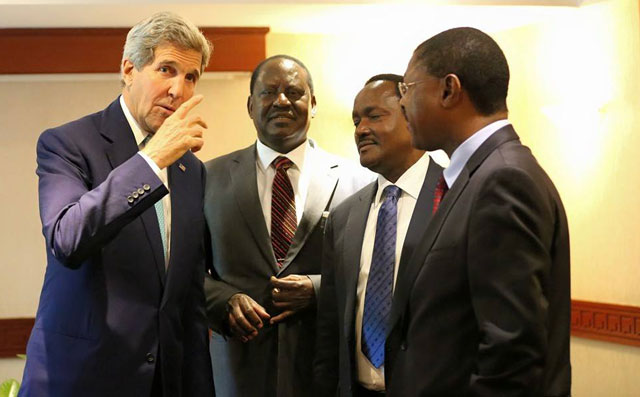
To explain this, analysts pointed to an “overly approving” tone from observers, who by their own admission were seeking to “encourage” the electoral process.
“At that point, what we were worried about was more the possibility for violence,” said Sarah Johnson, an associate director in the Carter Center’s democracy programme.
Nic Cheeseman, professor of African politics at the University of Birmingham, said the legacy of 2007 when over 1,100 people died in post-election violence put observers in a difficult position.
Some international observers — notably the EU — were more critical, but all eyes were on the big names: former US secretary of state John Kerry who headed the Carter Centre mission, and former South African president Thabo Mbeki leading the AU team.
Both skirted over allegations of irregularities before appealing for peace and taking a tone which was “way too positive”, said one Kenyan analyst.
“(Kerry) called the ones who were protesting against the election to go to court or concede defeat, but I think he insisted too much on the second option and, among other things, he talked about his personal experience” of conceding defeat in 2004, he said.
Kerry’s high profile compounded the impact of his words because he was sometimes misconstrued as speaking for the United States rather than for an independent observer mission.
Days later, as the IEBC delayed in its legal obligation to publish tally forms from every polling centre, observation missions became much more critical but in press releases that had “less weight” and failed to grab the attention of their earlier public pronouncements, the analyst said.
.@nytimes editorial board changes its mind about Kenya’s elections, calls #SupremeCourtDecides “courageous decision” https://t.co/F8xWxFFu7A
— Abdi Latif Dahir (@Lattif) September 4, 2017
Marietje Schaake, a European MP who led the EU observation mission, blamed the “polarised” and partisan nature of Kenyan political discourse: “We get criticism for almost everything we say, from one side or the other.”
Schaake said that many in the media — both Kenyan and international, wilfully or otherwise — ignored the nuances of her preliminary report, preferring a soundbite answer to an impossibly simple question.
“Media are looking for one answer to one question, and that is were the elections free and fair?”
Jeffrey Smith, executive director of Vanguard Africa, a US organisation promoting free and transparent elections, said that observers in Kenya were seen as putting “a stamp of approval” on flawed elections.
“The bar for what constitutes acceptable elections in Africa has been lowered to such an extent that it is virtually meaningless,” he said. “Now, when observers say ‘peaceful’ everyone hears ‘free, fair and credible’.”
So what then is the point of the observers?
Writing in Le Monde newspaper, Nigerian journalist Seidik Abba criticised the “mercenary” nature of parachute observers, former heads of state and ministers who “get back on their planes the day after the vote.”
The Kenyan example, he wrote, reveals election observation in Africa, “is a masquerade that must simply be abandoned.”
But the ICG sees a role for observers who, “like the media and outside organisations, can play a central role in deterring abuse and in improving the atmosphere in heavily polarised environments”.
That description is apt for Kenya, ahead of another bitterly contested presidential election which will take place in five weeks’ time.
 The Independent Uganda: You get the Truth we Pay the Price
The Independent Uganda: You get the Truth we Pay the Price


